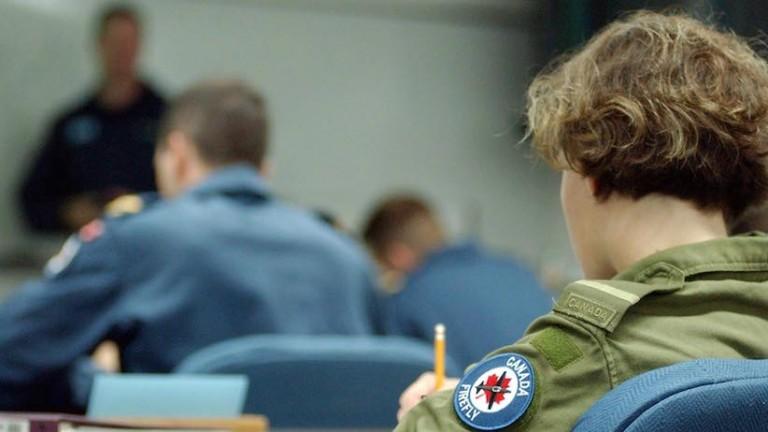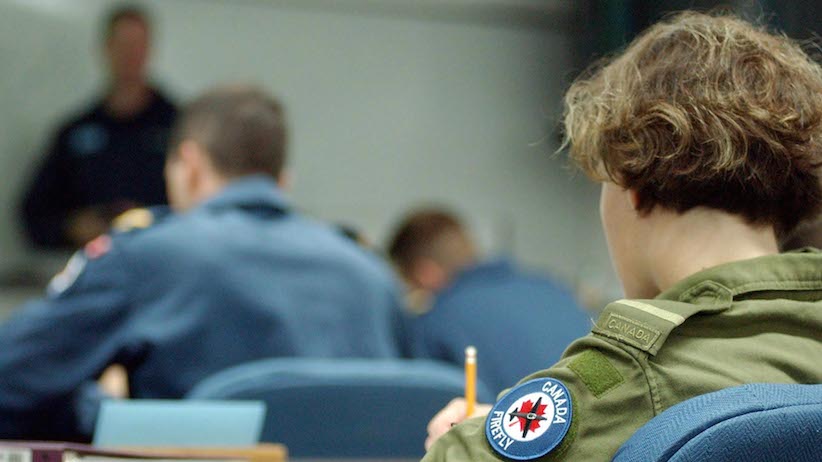Officials react to ‘disturbing’ report on military sex assaults
Report by Maclean’s and L’actualité on sexual assaults in the military sparks an external review

(Robert Dall/CP)
Share

When Scott Taylor woke up last Friday, he had never seen so many emails in his inbox. There were statements from Canada’s Defence Minister Rob Nicholson who said he was “deeply angered” to learn about alleged sexual assaults in the military, and Gen. Tom Lawson, the chief of defence staff, who added he was “profoundly disturbed.” “I think they sent it to every email address that we have,” says Taylor, a former infantryman and current editor of the Canadian military magazine Esprit de Corps. After a cover story last week in both Maclean’s and its sister publication L’actualité reported that five individuals in the Canadian military are victims of sexual assault every day, Lawson ordered two immediate reviews into the problem, one internal and the other an external review of the Canadian Forces policies and practices.
“It must be clear to everyone within the [Canadian Forces] that complainants are free to report any misconduct, and that they will be supported by their chain of command without fear of reprisal,” Lawson said in the statement. The Department of National Defence says the independent external review will measure the effectiveness of current policies, look at the workplace culture of the Canadian Forces, examine programs that address sexual assault, and see what measures are in place to protect victims. Details about who, exactly, will conduct the review have yet to be announced.
“By having an external review, it’s going to come back and recommend zero tolerance. They should already have that,” says Taylor. “They need to convince their own personnel that there’s a change in mindset.” The review, he adds, deflects the criticism away from one important question: “Who is to blame for the failure of this magnitude?”
In response to the story’s widespread allegations of sexual assault, the Opposition NDP asked the Conservative government to release the results of internal investigations by the chief of defence staff to see how the policies could have led to these offences. The NDP also filed a motion on Tuesday to have Lawson, Judge Advocate General Major-Gen.Blaise Cathcart, and the chief of military personnel, Major-Gen. David Millar, appear before the standing committee on national defence to answer questions about the extent of sexual assault in the Forces. “This is not a one-day story,” says NDP defence critic Jack Harris. “This is a story that cries out for justice and reform of the approach.”
Gary Walbourne, who took over as ombudsman for the Department of National Defence and the Canadian Forces in March, says he is pleased with the first steps taken by Lawson. While the ombudsman’s office can’t investigate criminal allegations, Walbourne says he believes there will be more checks and balances in the system to ensure all com- plaints are treated fairly. “We’re going to stay on top of this issue and not wait another 16 years before there’s another review or update.”
Sixteen years ago, the Forces were embroiled in a very similar scandal. In 1998, Maclean’s published four cover stories about sexual assault in the military over the course of a nine-month investigation. The military’s response then was to create a new dedicated 1-800 line for sexual assault, and urge victims to speak directly with the chief of defence staff. They created an advisory panel for gender integration, appointed an ombudsman, and promised to investigate the 31 cases of those who shared their stories with Maclean’s.
But last week’s special investigation shows how the problem persists. Since 2000, the report says, military police received an average of 178 complaints of sexual assault each year. For that reason, Michel Drapeau, a retired army colonel who specializes in military law, says the review panel should be comprised of a criminal lawyer, two non-military judges, a psychologist and a social worker. “You need somebody with a fresh mind and independent thoughts who looks at this ques- tion: Is the military equipped to investigate, police and prosecute sexual assault?” Drapeau says. “We have the answer. No. They had 16 years to fix it, and they haven’t.”
As for those in the military who are charged with sexual assault, Drapeau says he’d prefer to see the case handled by civilian authorities as opposed to military court. In the case of James Wilks, an ex-navy medic who fondled women during unauthorized breast exams, he was found guilty in November on 10 counts of sexual assault and 15 counts of breach of trust. Earlier this week, a military judge sentenced Wilks to 30 months in prison. (He remains free as he appeals the verdict.) “I thought he should have done a year for each victim,” Kristen Harms, one of the victims, told the London Free Press. “I thought the military was trying to make it look like they were taking things more seriously, but it doesn’t seem like they are doing that with this short sentence.”